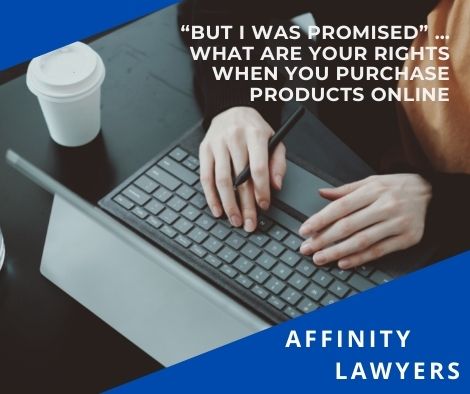A warranty is a voluntary promise made by a supplier of goods or services to an individual. This promise can be recognised as a right at law and enforceable by the individual (“consumer”) under the Australian Consumer Law (“ACL”) legislation. It is important to understand that consumers are automatically entitled to ‘guarantees’ under the ACL, however these differ from warranties.
AUTOMATIC GUARANTEES
Consumer guarantees are a set of rules governed by the ACL that automatically apply to goods or services purchased by an individual. The guarantees are applicable regardless of whether a written or oral voluntary promise is provided by the supplier.
Who is a Consumer?
A person or a business will be considered a consumer if they:
· purchase goods or services for less than $100,000.00;
· purchase goods or services for more than $100,000.00, ordinarily used for personal or household use;
· purchase goods that are a commercial road vehicle or trailer (to be used primarily for the transportation of goods on public roads).
What are Consumer Guarantees?
Consumer guarantees on goods and services are assessed as follows:
Goods must be of a reasonably acceptable quality that would normally be expected for that type of product and cost. This includes (but is not limited to) ensuring the goods match the description provided by the supplier, be fit for purpose, come with full title and ownership, not carry any hidden debts or extra charges and have spare parts and repair facilities available for a reasonable time after purchase (unless advised otherwise).
Services must be provided with a reasonable level of care and skill, be fit for purpose and delivered within a reasonable time frame (where there is no agreed end date).
Additionally, consumer guarantees may be applicable to further goods and services including gifts with a proof of purchase (i.e. receipt), sale items, online products and services brought from Australian businesses and/or second-hand products from businesses.
In this regard, a supplier may be in breach of the law if they mislead you into paying for rights (i.e. additional and/or extended warranties) that you are already automatically entitled to under the ACL consumer guarantees.
UNDERSTANDING WARRANTIES
Warranties are distinct promises or representations that generally induce an individual to pay for a service or goods.
A common example is where a supplier provides a warranty by way of a promise as to the replacement or repair of defective goods. This is generally an oral representation made during the ‘sales pitch’ of the goods. If you are contemplating purchasing goods and may potentially need to rely on the verbal promise provided by the supplier, we recommend taking the following steps:
· ensure that the promise is provided in a written document (“warranty document”);
· confirm that the warranty document sets out a precise description of the goods including the qualities and characteristics;
· ensure the warranties are particularised; and
· any obligations on the part of the supplier in relation to the replacement and repair of any defective goods are specified.
RELIANCE ON WARRANTIES
The ACL states that any express warranties made by suppliers in relation to goods or services, may be relied upon by a consumer. An express warranty relates to an undertaking, assertion or representation made, that induces an individual to purchase the goods, in relation to any of the following:
· the quality, state, condition, performance or characteristics of the goods; or
· the provision of services that are or may at any time be required for the goods; or
· the supply of parts that are or may at any time be required for the goods; or
· the future availability of identical goods.
If a consumer relies on an express warranty that has been falsely provided or has misled the individual into purchasing the goods or services, they may be able to make a claim under the ACL for misleading and deceptive conduct and/or false representation.
MISLEADING AND DECEPTIVE CONDUCT AND FALSE REPRESENTATIONS
The ACL protects consumers from misleading and deceptive conduct and false representations that can arise during supplier – consumer transactions in trade or commerce. The courts have recognised that a situation involving this type of issue, will require a determination of the facts and evidence within the entire context of the situation.
The High Court in the case of Campbell v Backoffice Investments Pty Ltd [2009] discussed the characterisation element of misleading and deceptive conduct and summarised that it requires ‘consideration of whether the impugned conduct viewed as a whole has a tendency to lead a person into error’. Therefore, it is important that the warranty provided by the supplier is in writing, clear and easily understood by the consumer, to avoid any undue confusion. If you are confused as to a warranty or promise provided by a supplier, it is important that you seek legal advice prior to entering into a potentially binding contractual arrangement.
Please feel free to contact one of our Solicitors here at Affinity Lawyers for assistance on (07) 5563 8970.


